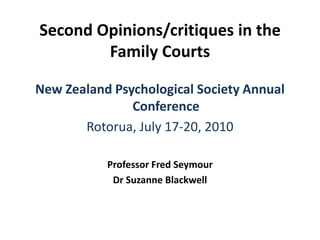
Second opinions, critiques in the family courts, F Seymour
- 1. Second Opinions/critiques in the Family Courts New Zealand Psychological Society Annual Conference Rotorua, July 17-20, 2010 Professor Fred Seymour Dr Suzanne Blackwell
- 2. Background to 1995 Guidelines CSA case with six psychologists Rise in requests for psychologists’ partisan reports Confusion about terms of engagement and obligation to cooperate Undesirability of re-interviewing of children Generation of bad feelings between psychologists Realisation we were being dragged into an adversarial way of operating
- 3. Development of 1995 Guidelines Draft prepared for NZPS conference Presented at NZ “road show” 1996 Checked with Judge Mahony
- 4. 2010 Survey This revealed some of the same issues: Overall a concern about critiques’ impact on professional relationships However positive comments about critiques done “correctly”
- 5. Negative comments included Concerns about the qualifications and expertise of the critiquing person Not being informed a critique is being performed Difficulties in being paid Lack of clarity about access to notes
- 6. Other issues that emerged Terminology Lack of specific brief Distinction between consultation with a lawyer, and a critique report Opportunity/right to see the critique report before the hearing
- 7. Code of Conduct for Expert Witnesses How does our practice measure up to this document? Demand for relevant competence/expertise Duty is to the court Expectations that experts will confer if directed by the court
- 8. Other considerations Code of Ethics as a guide to professional conduct Supporting new practitioners Asserting our own manner of conduct rather than being manipulated by a system that is not of our design (inquisitorial v adversarial) Best interests of the child principle
- 9. Do the old Guidelines still apply? They are no longer readily available Generally they do hold up in terms of the High Court Rules (Code of Conduct)
- 10. 1995 Guidelines emphasised principles of: Being respectful of colleagues Minimal intrusion on family members Retained focus on best interests of child Working as collaboratively as possible
- 11. Other key considerations in the 1995 guide It is a right to have a critique done therefore there is a duty to cooperate To minimise the demand for critiques we should endeavour to produce competent reports in the first place Critiques should be “controlled” by the court: Needs a judicial direction on what data are to be released, to whom, and a specific relevant brief
- 12. Access to notes and other materials This defined in the 2006 Practice Note All applications for release of notes shall be made to the Family Court Privacy Act does not apply A copy of the second opinion report will be given to the report writer appointed by the court Generally notes and materials will not be released to Counsel
- 13. Implications re access to notes Don’t release notes unless there is a court order/direction that you have sighted Don’t copy notes: have the psychologist attend your office If meeting with the other psychologist, confine interactions to clarifications issues (wait for access to report before any discussion)
- 14. Payment Critique writer: avoid direct payment from client (use lawyer’s trust account) Report writer: Unlikely to be paid by court (except for full second opinion) so ensure funds available (should be a disbursement of the critique writer and paid immediately)
- 15. Comments/feedback to f.seymour@auckland.ac.nz s.blackwell@auckland.ac.nz suzanne.blackwell@xtra.co.nz
